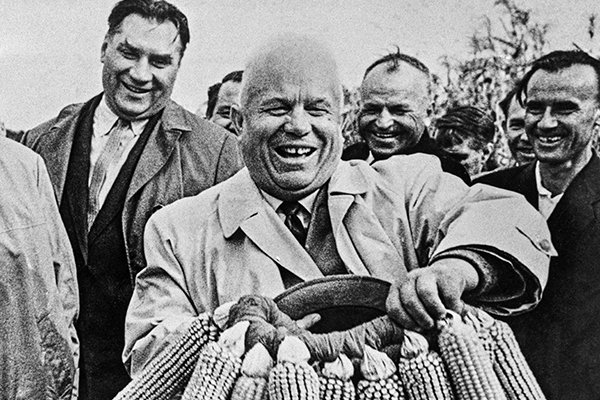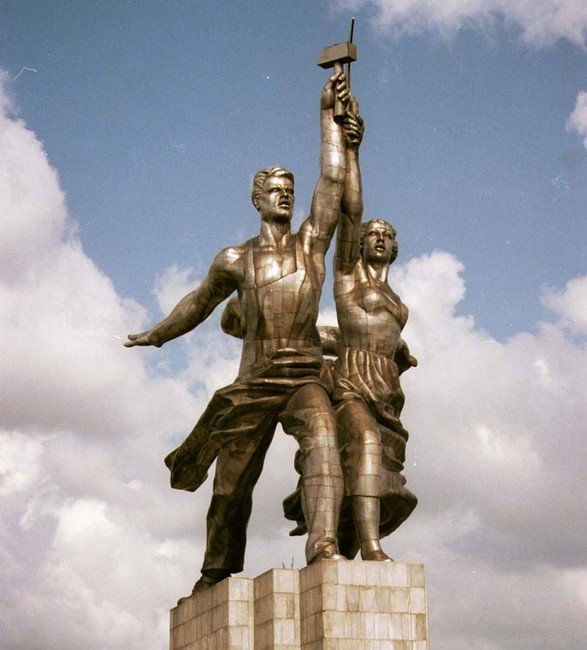The Planned Economy
Unlike the “Wild West” where the economy developed based on the supply and demand of a free market, the socialist economy was planned. That meant that the central organization in Moscow planned any kind of production enterprise everywhere in the country. That central organization developed a 5-year plan of economic development.
I am not an economist, but in theory, this looks like a good idea. If the country needs automobiles, let’s build it near the iron mills and then next to it build another factory that produces tires, and near it to put a textile factory, so there would be a fair balance of men and women. Then again, that is good in theory.
When Nikita Khrushchev went to the USA he was very impressed with the American agricultural technology of corn production.

He decided to expand the corn production in USSR without consideration compare to IOWA most of the USSR lands located much more to the North. He ordered top stop growing many traditional northern cultures and replacing them with corn. Because he was the general secretary of the communist party he was setting up the tone of the narrative and the entire country glorified this policy. However, the results turned out to be pitiful.
The corn narrative gradually nullified and agricultural regions returned to the traditional type of crops. Thus, all the reasonable planning could easily be nullified by the fact that people had to go on their tiptoes about the current bureaucrat that occupies the big chair and defines the new zigzag of the dominant narrative.
However, that type of voluntarism was not the only problem of the planned economy. Every plan could be only as good as the information it operates on.
And this information coming from different places is far from being exact.
The dominant public narrative pushed by the media stated that because the Soviet person is the most progressive type of person and they work creatively and enthusiastically they can produce more than it is possible with the current level of technical equipment on the factory site. Also, the local administration, trying to produce an impression on the ministry, came up with what was called a “counter-plan” or an obligation to produce more than it was requested.
Again, I am not an economist and didn’t live long enough in the Soviet Union to experience this paradigm first hand. However, from what I heard and remember the “counter-plan” was mostly a lip service that produced inflated numbers that diverge from the actual numbers making the planned central economy a big mess.
The dominant narrative suggested that the increase of production volume as per “counter-plan” would be achieved because the most progressive Soviet person, the “new breed” would promote innovation at the production site at the grass-root level. I have to explain this one.
You see, according to the official narrative socialism produced a new type of person, which is better than any other type of people, who lived in previous societal formations. And since the hegemon of socialist society, its backbone, was a conglomerate of a worker and a collective farmer, for they were the ones who were the underlying force of the socialist revolution, they were that human material out of which this new soviet person was molded.

Thus, workers and farmers were supposed to produce many new and useful innovative ideas for the good of the entire country and all the progressive humanity. At least, that’s what was expected from them and, as a socialist country planned everything; it also planned that some smart workers would come forward with new brilliant ideas. Those innovations were called “rational suggestions.”
It is possible that somewhere among millions of square miles of the Soviet Union indeed were such workers. I don’t know.
What I do know is that my dad, who was a safety engineer by trade, was assigned to come up with those “grass-root innovations” and write them as a proposal. In other words, he was a ghostwriter behind the grass-root innovations, and once the proposal was written, the administration decided, which worker would be the author of that “innovation” this month.
Then the “innovation” was sent to the ministry along with the factory report. As far as I know, no one used those suggestions. I doubt anybody read them. They were the cherry on top, the part of ideological boost. The name of the distinguished worker was placed on the honor list as well as he was congratulated in the factory wall newspaper.
I think some people might like living under socialism and some who don't. And before rocking a pendulum toward it has to clearly understand its advantages and disadvantages.
As for me, looking back at that time right now seems like it happened with a different person like my mind rolls through the frames of the old documentary. Thinking about it, I’d like to post a question to old Uncle Marx “Was that what you were trying to achieve while writing your ‘Capital’? or as his mother Henriette put it “Karl, why didn’t you make a capital rather than writing about it?” Wasn’t she a wise woman?

Greatly enjoyed all 5 articles in this series and following you for more. :) Thanks!
Thank you so much! Glad you liked it.
А-а! Так вот как писались "рацпредложения"))) Хах) Не знал об этом, но не удивлён.
Бабушка рассказывала другое. Она занималась "контролем качества" на авиационном заводе. Было так.
Вот сделана партия очередных деталей. Проверяют и видно - качество настолько ужасное 90% надо просто в переплавку. А "план горит", естественно.
В чём заключались обязанности моей бабушки. Нужно было выписать кодовое обозначение этой детали и пойти в конструкторское бюро, осторожно спросить у инженеров - "А что это вообще такое и насколько оно важно для самолёта?"
И вот, если это была какая-то железяка для ручки кресла или дверцы в салоне - тогда ничего страшного, всю партию деталей признавали качественной и торжественно отчитывались, как быстро работает наш конвейер.
А вот если инженер, поковырявшись в чертежах, говорил, что это важная деталь для двигателя и она важна для того, чтобы самолёт вообще взлетел и не упал внезапно - тогда эти 90% некачественных железок отправляли обратно в печь.@mgaft1
Но поскольку "план горел" всегда, то самолёты всё равно падали, хоть и не очень часто)
Точною "рацпредложения." Я, откровенно, не знаю как точно это перевести, так как здесь нет социального эквивалента. Ну да, как-то перевел.
Детали самолетов, а. Вот вам - прелести социализма. )))